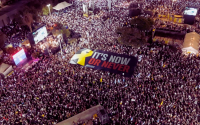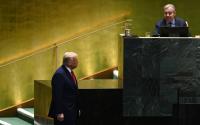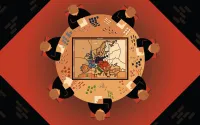My first reaction to the capture of Saddam Hussein was both anger and disgust. Anger with the old dictator who could not even die honourably. He preferred to be captured by his old friends than to go down fighting, the one decent thing he could have done for his country.
I felt no pity for Saddam. He had killed some dear comrades of mine and imprisoned too many others, but the US had no right to do this. It was the responsibility of the Iraqi people.
I also felt disgust with the way in which the TV networks were covering this event. CNN and BBC World had become total propaganda networks, to such an extent that it must have made Berlusconi smile. Parading a captured prisoner in this fashion is the new model of imperialism. The latter-day equivalent of how barbarian chieftains were paraded in ancient Rome, prior to their execution.
For years the US had built up Saddam as the big bogeyman in the Middle-East. Now that he has gone what possible excuse is there for the Western soldiers to remain in Iraq? Why not an immediate general election to elect a Constituent Assembly? Is it because an elected Assembly would demand an immediate end to the Occupation, Iraqi control of Iraqi oil and Iraqi firms to reconstruct their country? These demands will unite the bulk of Iraqis regardless of their religious or ethnic origin.
What effect will Saddam's arrest have on the resistance? Several weeks ago I wrote that even if Saddam was captured and killed, the resistance would continue. There is no reason to change that view. In fact those who were, till now, reluctant to back the resistance will now come out openly against the Occupation. Those in the US and elsewhere who argued that the resistance was led by Saddam and the remnants of the old regime, will now get a big shock. This week a peaceful mass uprising in Hilla removed a US-appointed Governor. The slogan chanted by the people was: "Free elections now!' Actions of this type are bound to increase.
If it is true, as the warmongers argued once they couldn't find any 'weapons of mass destruction', that they were ridding Iraq of a tyrant, the logic should now be an immediate end to the Occupation. I don't think this will happen. That is why a political resistance could spread throughout the country. Banning trades-unions as the Occupation has done won't make too much difference. The Iraqi underground is vibrant and hopeful.
And what will they do with Saddam? The Occupation of Iraq is illegal and so the US will not tempt international law by trying him in the Hague. There is a further problem. In order to help Kissinger and other US war criminals it was agreed that leaders cannot be charged retrospectively. If there is a tribunal in Iraq, it will, like every other institution today, be US-dominated. Will it be public? And what if old rogue decides to tell the whole story of his collaboration with the US throughout the Eighties of the last century? What if he reveals his conversations with Donald Rumsfeld during the Iran-Iraq war? Its a problem for them. So they will do what suits their interests.
After all, the Emperor Hirohito in Japan sanctioned and supported a war that led to the deaths of tens of millions during the Second World war. He was needed against Communism and so they transformed him into a friendly marine biologist.
I don't think they need Saddam any more, so he can't be transformed into a friendly neighbourhood archaelogist, but they will try and get what they want out of him, though even a broken and defeated Saddam is unlikely to help them find the weapons that never existed.






